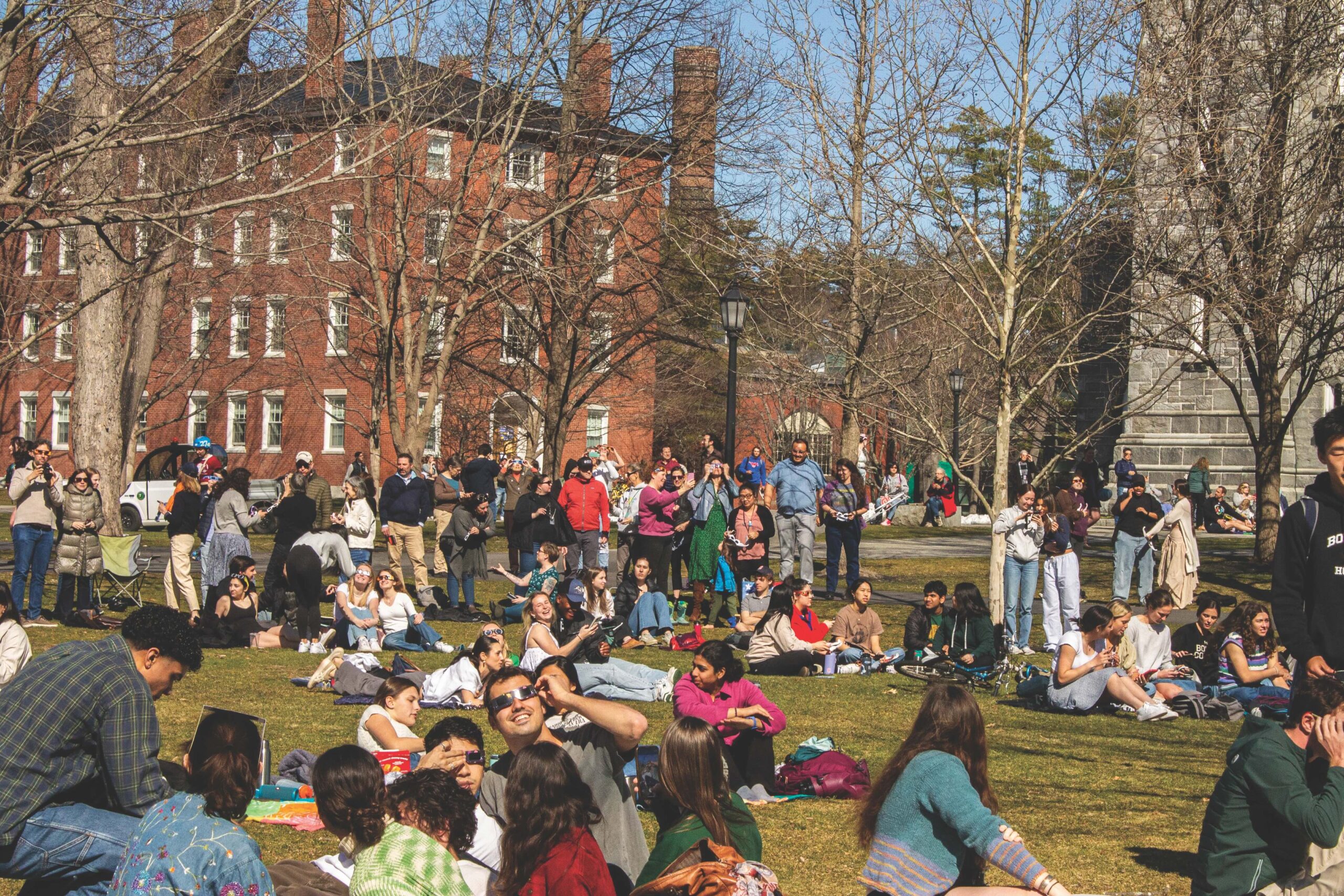Bowdoin students, staff view the solar eclipse with awe
April 12, 2024
 Lilli Frank
Lilli FrankOn Monday, a 115-mile-wide swath of Maine was covered in a silver-tinged shadow as a total solar eclipse engulfed much of the Pine Tree State. Bowdoin students left their dorms to get a brief glimpse of the event—one which won’t come to the region again until 2079—on campus and across Maine.
On campus, many students, staff and faculty members joined together on the Main Quad to watch the eclipse—which reached nearly 97 percent totality—in an informal viewing party. The Physics and Astronomy Department handed out 450 pairs of eclipse glasses on the quad to the onlookers.
“It’s an event of significance. Not only the astronomical event itself but its ability to mobilize people. That’s what I found astounding. People were astonished by it,” Vincent Han ’24, who viewed the eclipse on the quad, said.
A solar eclipse occurs when the Moon passes directly between the Sun and Earth. The last eclipse that passed over Maine occurred in the summer of 1963. Brunswick, being outside of the zone of totality, experienced a partial solar eclipse on Monday.
Sam McClelland ’24 was on the Main Quad for the eclipse and said she observed a unique phenomenon: shadow bands. These bands are gray ripples seen by some observers during a solar eclipse. Although their cause is unclear, it is likely that they are a meteorological effect produced by the distortion of the Sun’s rays by the Earth’s atmosphere.
“It was almost like seeing the shadow from waves,” McClelland said.
Other students, on the other hand, were less impressed by the solar eclipse.
“I thought it was a little bit underwhelming. I thought it would be darker. It was a weird type of dark, though. It was fun having everyone together on the Quad,” Emilia Rose ’26 said.
Some professors on campus canceled classes for the big day. Professor of English and Cinema Studies Aviva Briefel canceled her English seminar due to what she said would have been low turnout.
“Initially, I thought we could interrupt class and watch the eclipse on campus, but many people wanted to experience totality,” Briefel wrote in an email to the Orient. “The eclipse is a pretty spectacular and rare event, so I completely understand that students would want to see it.”
But not all life on campus stopped. Sadie New ’25, a tour guide, was leading a tour during partial totality. She said she made an intentional effort to be on the quad during the event.
“You can always go into a building, but you can’t always see the eclipse. It was a lot of fun,” New said.
Some departments took advantage of the event to venture off of campus. The Physics and Astronomy Department, led by Assistant Professor of Physics Felicia McBride, voyaged to Jackman, nearly 150 miles north of the College. Forty-five students accompanied the department.
McBride said she chose Jackman because it is directly on the centerline of the totality. This meant that the sun covered the moon for the longest amount of time—three minutes and 27 seconds.
“It’s something that you either have to travel for or take the chance next time it comes up. I wanted to give as many students as possible the opportunity to see such a rare event,” McBride said.
David Ma ’24, a Physics and Math double major, went to Jackman with the department. Ma described his experience as “elite.”
“The traffic was bad, but nonetheless worth it to see a beautiful moment, ” Ma said.
The Physics and Astronomy Department wasn’t alone in its exodus from campus. Professor of Art Michael Kolster took both of his photography classes to Houlton, located on the Maine-New Brunswick, Canada border.
Kolster said that he took his classes to Houlton because it was in the path of totality and had convenient parking. He described the eclipse as “astounding,” partially because of the unity he felt in Houlton.
“I guess I didn’t know what to expect, and that’s one of the things that was interesting to me,” Kolster said. “The weather was perfect … it engendered a lot of joy and amazement—a collective one.”
One of those who went on the trip was Eduardo Mendoza ’24. Mendoza kept his comment on the eclipse simple.
“Shit was awesome,” Mendoza said.
In Houlton, Bowdoin students were welcomed by many local business owners. Brian Crane, owner of The Tulgey Wood Emporium on Houlton’s Court Street, said that the increased tourism to Houlton benefited his business. Crane said he talked with people who came from all over the world, even as far away as Australia and New Zealand.
“It’s huge. We had a steady flow of people,” Crane said. “You’ve got thousands of people. It’s a small town, but now it’s huge.”
This exodus, however, was not without its consequences on campus. Some offices with student workers, like Interlibrary Loan, lost many of their staff as they went to get a glimpse of the once-in-a-lifetime celestial event. Out of the 11 student workers employed by the department, ten called off work. However, Interlibrary Loan Supervisor Guy Saldanha said that this didn’t necessarily impact the office’s ability to deliver books to students.
“Our services were not disrupted for users because regular Library staff were on duty,” Saldanha wrote in an email to the Orient.
The next eclipse that can be seen from Maine will not happen until 2079, the year the Orient will celebrate its 208th anniversary.
Caitlin Panicker contributed to this report.

Comments
Before submitting a comment, please review our comment policy. Some key points from the policy: